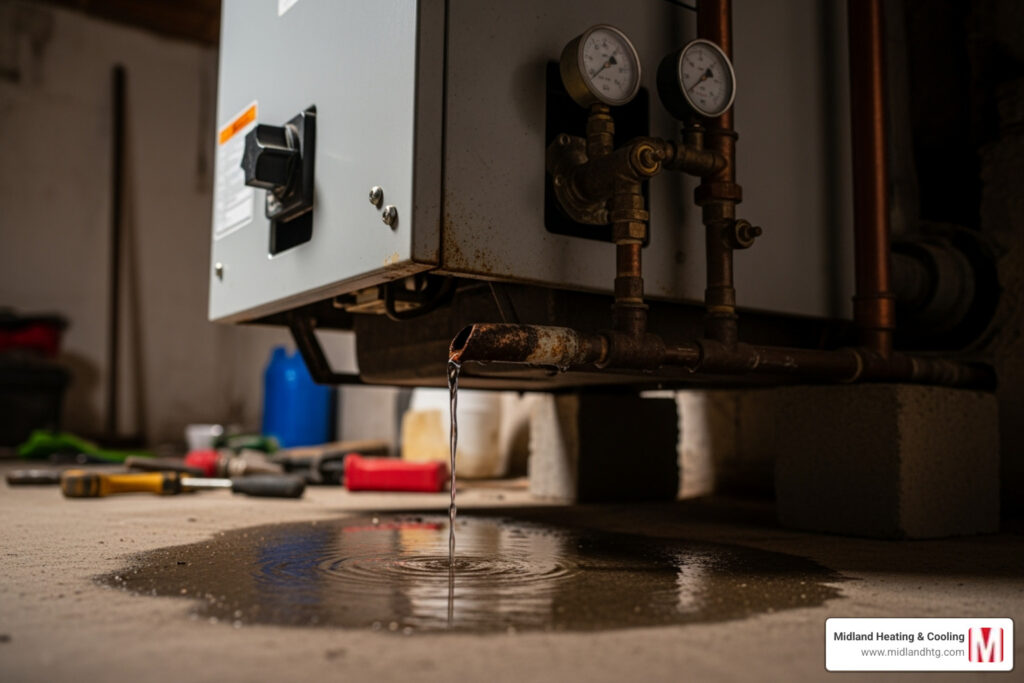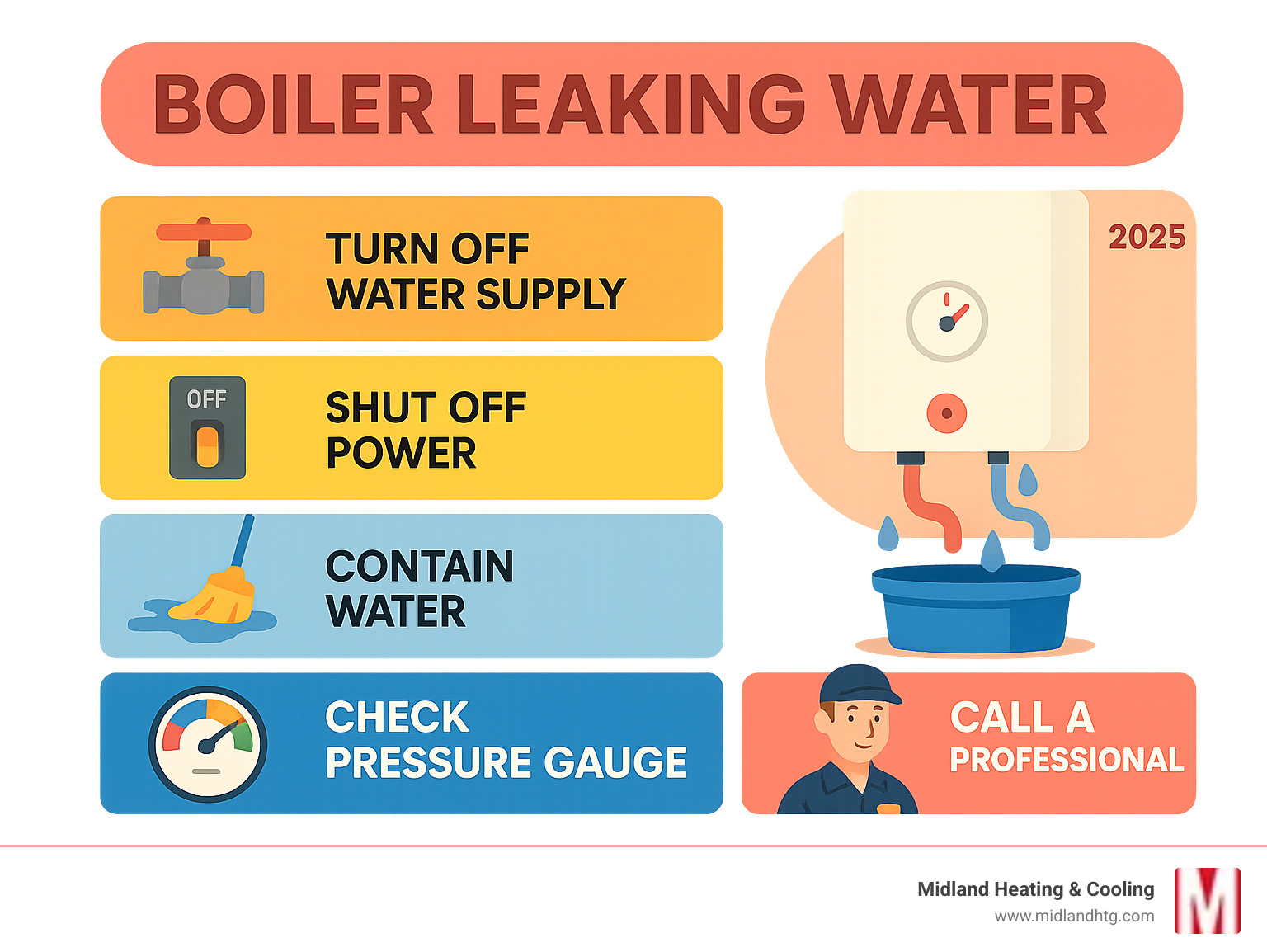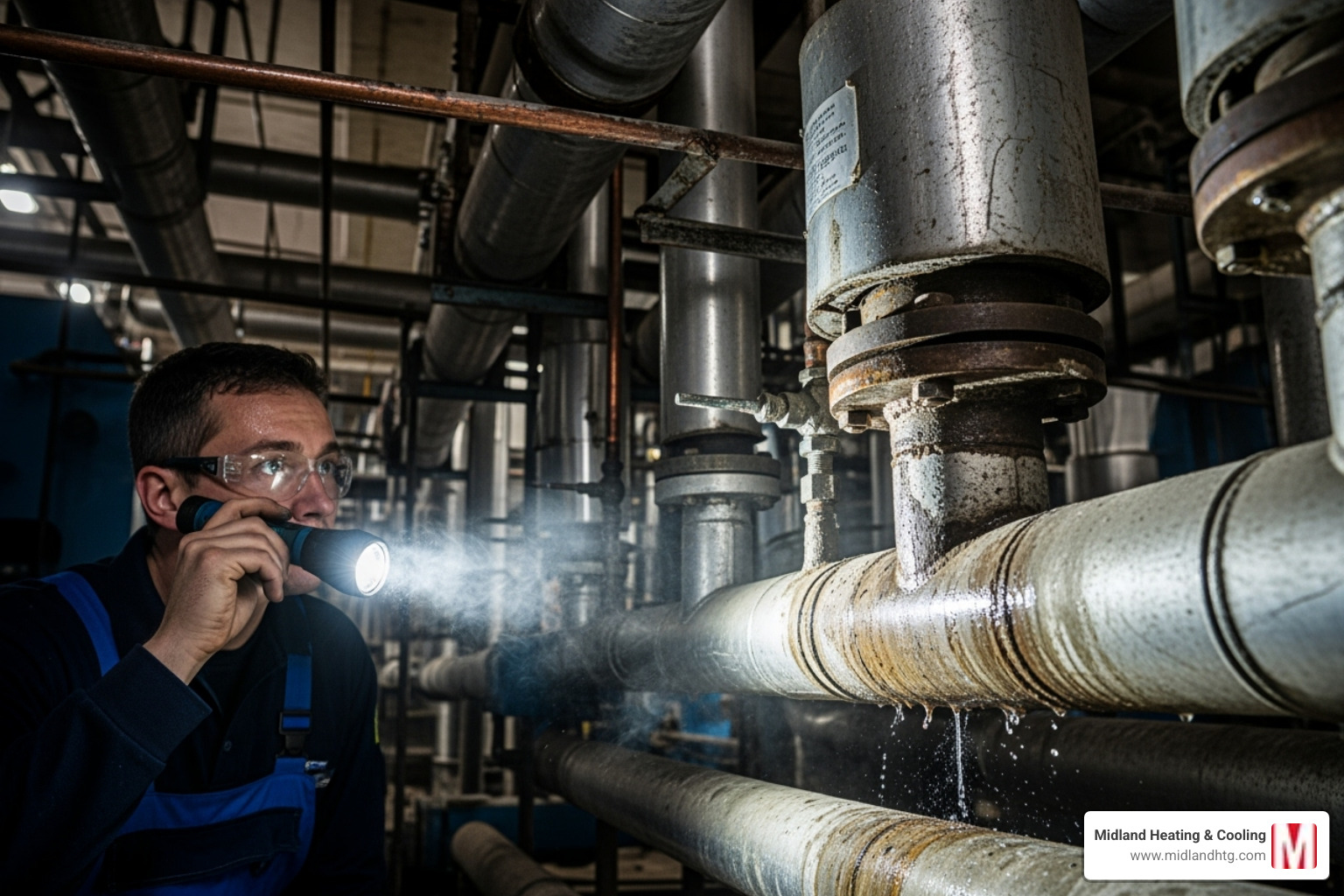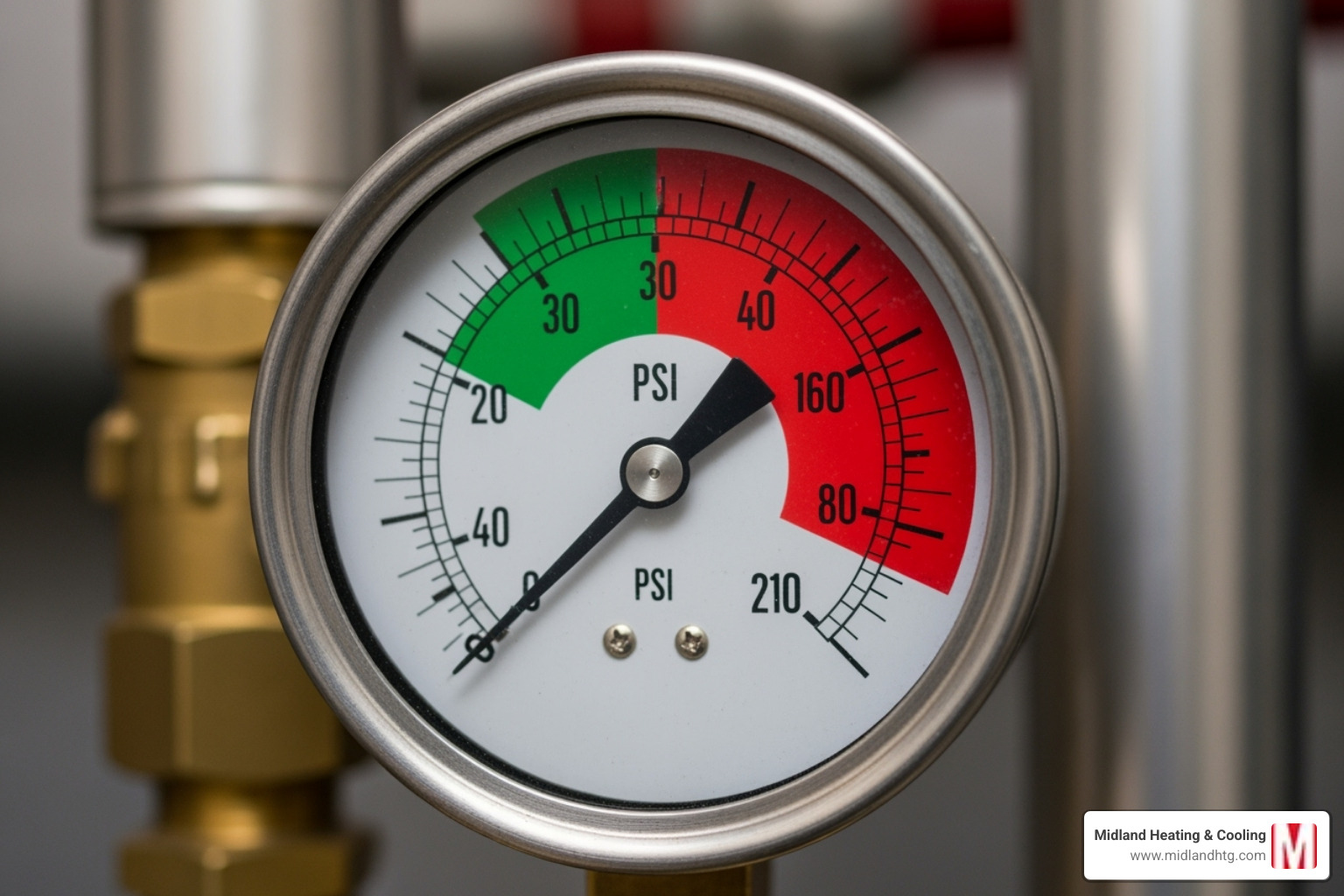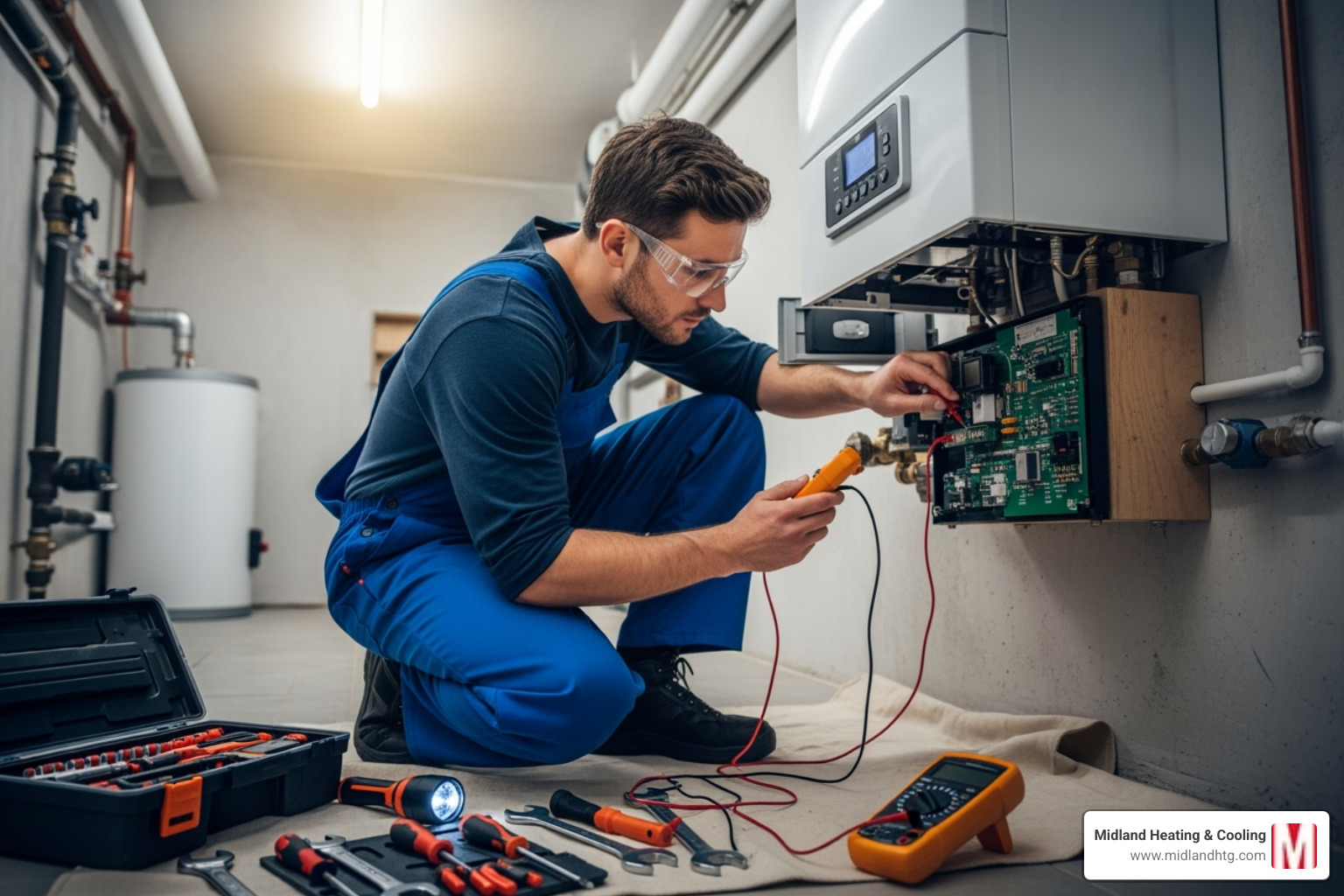What to Do When You Find a Puddle
A boiler leaking water can quickly turn from a small drip into a homeowner’s nightmare. Whether you’ve spotted water pooling beneath your unit or noticed mysterious puddles, taking immediate action is crucial to prevent costly damage.
When you find a boiler leak, follow these immediate steps:
- Turn off the water supply to your boiler using the internal stop tap.
- Switch off the electricity to the unit at the breaker or boiler switch.
- Clean up standing water to prevent damage and mold growth.
- Check your boiler’s pressure gauge – if it’s in the red zone, this may indicate the cause.
- Call a professional if the leak is significant or you can’t identify the source.
Common causes of boiler water leaks include:
- High boiler pressure (above 2 bar)
- Corroded pipes, valves, or tank components
- A faulty or cracked heat exchanger
- Worn seals and gaskets
- Blocked condensation pipes
While a confident homeowner might tighten a loose fitting, most boiler leaks require professional repair. A small leak can lead to major water damage, mold, electrical problems, and system failure if ignored. The good news is that most leaks are fixable when caught early and can often be prevented with annual maintenance.
What are the dangers of a boiler leaking water?
Finding a boiler leaking water is more than an inconvenience; it poses serious risks. Ignoring a leak, no matter how small, leads to escalating problems.
First, water damage is a major concern. Continuous drips can soak floors, damage ceilings, and weaken your home’s structure. This damage is often far more costly to repair than the initial leak itself.
Next, the dampness from a leak creates a perfect breeding ground for mold, which can cause unpleasant odors and pose health risks, especially for those with allergies or respiratory issues.
There is also an electrical danger. Water and electricity are a perilous mix. A leak near your boiler’s electrical components can cause short circuits, system malfunctions, or even fire. This is why turning off the power supply is a critical first step.
Finally, a leak signals an internal problem that can worsen, leading to complete system failure—meaning no heat or hot water. This can also cause damage to your heating system, accelerating wear and leading to premature replacement. Promptly addressing the leak protects your home and preserves your boiler’s lifespan.
First Response: Immediate Steps for a Leaking Boiler
Finding your boiler leaking water is stressful, but quick action can prevent major damage. These first steps are about making the situation safe.
Your safety comes first. Turn off the water supply to the boiler using the stop tap (a small valve on the inlet pipe). Then, cut the electricity at your breaker panel or the boiler’s power switch. This prevents electrical hazards and stops the boiler from operating while compromised.
Now, contain the water. Use towels, buckets, or a wet vacuum to soak up any standing water to protect your floors and walls. While cleaning, take photos or videos of the leak and damage for your technician and any potential insurance claims.
These safety steps won’t fix the leak itself. While you might be tempted by DIY solutions for Common Boiler Repair Issues, complex repairs are risky and best left to professionals to avoid further damage or voiding your warranty.
Locating the Source of the Leak
After securing the area, try to locate the leak’s source. This information helps your technician diagnose the problem faster, potentially saving you time and money.
Start by checking the pipes connected to your boiler, paying close attention to joints for drips. A loose fitting can be a simple culprit. Next, inspect the valves, as the pressure relief and drain valves are common leak sources.
Don’t forget to look under the unit. Water pooling directly beneath the boiler often indicates an internal leak requiring professional repair. Also, check the boiler’s body for cracks or corrosion.
A helpful trick: dry the area completely and watch where water first reappears. This pinpoints the leak’s origin.
While this information is valuable, internal leaks and part replacements should be handled by professionals. Our certified technicians have the tools and expertise for a safe and effective repair.
Why Is My Boiler Leaking Water? Diagnosing the Source
When your boiler is leaking water, understanding the cause helps you make informed repair decisions. Most leaks have identifiable sources, and with over 70 years of experience in the Twin Cities, we’ve seen them all.
A leak is a sign that something is wrong with your boiler. It could be a simple fix or a serious issue requiring a professional. Identifying the cause is key to restoring your heat. Our guide on Boiler Problems That Require Attention details common issues.
High Boiler Pressure
Excessive pressure is a frequent cause of boiler leaks. Boilers should operate between 1 and 1.5 bar. If your pressure gauge is in the red zone or well above this range, high pressure is likely the culprit.
When pressure is too high, the pressure relief valve (PRV) opens to release water, protecting the system. If you see water dripping from the PRV, it’s doing its job, but the underlying cause of the high pressure needs to be addressed.
Bleeding your radiators can sometimes lower the pressure by releasing trapped air. However, if the pressure continues to rise or the PRV keeps leaking, it indicates a more significant problem, such as a faulty expansion vessel or filling loop.
Corrosion and Age-Related Wear
Corrosion is a common cause of leaks in older boilers. Over years of service, water and heat take a toll on metal components like pipes and the tank, causing them to weaken and leak.
Rubber seals and gaskets also deteriorate over time from constant exposure to heat and pressure changes. As they harden and crack, they can allow water to escape at connection points.
Rusty water or visible corrosion indicates internal decay. While replacing one part might be a temporary fix, widespread corrosion often means the boiler is near the end of its 20-year lifespan. Spotting these Signs Boiler Needs Professional Maintenance early is key.
Faulty Internal Components
A leak can also point to a specific failed internal component. While these require a professional diagnosis, understanding the possibilities helps you communicate with your technician.
- Heat Exchanger: This critical and expensive component can crack from temperature changes and mineral buildup, leading to leaks, often from the bottom of the unit.
- Pump Seals: The pump circulates hot water, and its seals can wear out, causing leaks around the pump itself.
- Internal Joints: Badly sealed internal pipe joints can fail due to poor installation or pressure fluctuations.
- Condensation Pipe: On high-efficiency boilers, this plastic pipe can get blocked by debris or freeze, causing condensate to back up and overflow.
- Auto-Air Vent: This and other small components can also fail and leak water. Understanding the Different Types of Boilers Explained can offer clues about potential issues with your specific model.
DIY Fix or Call a Pro? Knowing Your Limits
When your boiler is leaking water, the DIY impulse is strong, but it’s crucial to know your limits. Boilers are complex systems involving water, electricity, and gas under pressure, and repairs require specialized knowledge. As our guide on How Professionals Handle Boiler Repairs shows, mistakes can be dangerous, leading to gas leaks, electrical hazards, or costly damage that voids your warranty. Some jobs are simply best left to certified professionals.
Can I fix a boiler leaking water myself?
While most repairs need a pro, there are a few simple tasks a homeowner can safely attempt.
- Tightening fittings: If a leak comes from a visible, non-corroded pipe joint, you can try gently tightening it with a wrench (no more than a quarter turn). Dry the area and watch if the drip stops. If not, or if it requires force, stop and call a professional.
- Bleeding radiators: If your pressure gauge is high, bleeding your radiators can release pressure and may stop a leak from the pressure relief valve. This is a safe, common maintenance task.
Beyond these fixes, your best contribution is documenting the leak’s location, noting the pressure reading, and cleaning up the water to help our technicians. However, you must call a professional if these steps don’t work, the leak is internal, you smell gas, or there are electrical issues. Major or persistent leaks also require an expert.
When Professional Boiler Repair is Non-Negotiable
Some situations are non-negotiable and require immediate professional help for safety reasons.
- Gas Smell: This is an emergency. If you smell gas, turn off the supply (if safe), open windows, evacuate the house, and call your gas company’s emergency line and our team immediately.
- Internal Component Failure: Parts like the heat exchanger, pump, or expansion vessel require specialized tools and expertise. Incorrect installation can cause more damage.
- Electrical Issues: Flickering lights, tripped breakers, or burning smells combined with a water leak are extremely dangerous. Call a professional immediately.
- Major Leaks: Even if a leak seems mechanical, a large volume of water can cause extensive damage quickly. Professional intervention minimizes damage and saves money.
For persistent boiler problems in the Twin Cities, our team specializing in Boiler Repair in Minneapolis, MN can diagnose the root cause, as a simple leak can be a symptom of a more complex issue.
Repair or Replace? Making a Cost-Effective Decision
Deciding whether to repair or replace a boiler leaking water is a tough choice. The cost of repair can range from minor to major, depending on the issue. Several factors can help you make a cost-effective decision:
- Age: Boilers typically last 15-20 years. If yours is in or past this range, frequent repairs may become common.
- Repair Frequency: If this leak is one of many recent problems, replacement might be more economical than ongoing repairs.
- Energy Efficiency: Modern boilers are far more efficient. The long-term energy savings from a new unit can offset the initial cost, especially if your current boiler is over 10 years old.
Our guide on When to Consider Boiler Replacement offers more detail on this financial decision.
Signs It’s Time for a New Boiler
Sometimes, a leak is a clear sign that your boiler is at the end of its life and replacement is the wisest option.
- Cracked Heat Exchanger: This is the heart of your boiler. A crack is often so expensive to fix that replacement is the more logical choice.
- Widespread Corrosion: If rust has spread throughout the system, you’ll likely face a series of repairs. Replacing the unit is often a better long-term solution than fixing one corroded part after another.
- Obsolete Parts: For older boilers, finding replacement parts can be difficult or impossible. If a necessary part is no longer manufactured, replacement is your only option.
- Rising Energy Bills: A steady increase in your energy bills indicates your boiler is losing efficiency and working harder than it should. This is a strong sign it’s nearing the end of its life.
Our article, Is Old Boiler Worth Repairing or Replacing?, can help you decide. If you see these signs, our Boiler Replacement in Minneapolis, MN service can help you upgrade to a reliable, efficient new system.
Preventing Future Leaks with Regular Maintenance
The best way to deal with a boiler leaking water is to prevent it from happening. Proactive maintenance saves you stress, money, and water damage. Key prevention strategies include:
- Annual Service: A qualified technician can spot early warning signs like corrosion, loose connections, or aging seals before they cause leaks.
- System Flushing: Removing the sediment and sludge that builds up over time reduces internal corrosion and improves efficiency.
- Water Pressure Checks: Regularly check your pressure gauge. Keeping it in the optimal range (1-1.5 bar) prevents stress on the system.
- Visual Inspections: A quick look around your boiler every few months can help you spot drips or wear early.
Learn more from our guides on Essential Tips for Boiler Maintenance and Why Regular Boiler Service is Important.
Your Annual Boiler Maintenance Checklist
Our annual maintenance visit is a comprehensive health check for your boiler, designed to ensure it runs smoothly and prevent future problems.
Our checklist includes:
- Corrosion Check: We inspect the entire system for rust or discoloration, catching potential leaks before they start.
- Pressure Relief Valve (PRV) Test: We test this critical safety component to ensure it functions correctly, preventing pressure-related leaks.
- Flue Inspection: We check that the flue is clear and sealed to prevent operational issues that can stress the system.
- Component Cleaning: We clean vital parts like burners and heat exchangers to improve efficiency and reduce wear.
- Controls Test: We test all controls to ensure they are working correctly, preventing stress on the boiler.
- Seal and Gasket Examination: We inspect these components for wear and tear, replacing them proactively to prevent future leaks.
- Pressure and Air Check: We adjust water pressure and bleed radiators as needed to ensure optimal, low-stress operation.
This comprehensive service, detailed in our Top Boiler Maintenance Tips, is your best defense against unexpected leaks, offering reliability and peace of mind.
Frequently Asked Questions about Boiler Leaks
A boiler leaking water raises many questions. With over 70 years of experience in the Twin Cities, we’ve answered them all. Here are the most common ones.
Is a small boiler leak an emergency?
Yes, even a small leak requires immediate attention. A minor drip can quickly worsen, cause significant water damage, lead to mold growth, or create an electrical hazard. A leak is also a symptom of an underlying problem that could escalate. For any leak, turn off the boiler’s water and power supply, clean up the water, and call a professional for an assessment. It’s always better to be safe than sorry.
How much does it cost to fix a leaking boiler?
The cost to fix a leaking boiler varies widely depending on the cause.
- Minor Repairs: Tightening a fitting or replacing a simple valve is relatively inexpensive.
- Major Repairs: Fixing a failed pump or a cracked heat exchanger is a more significant investment. In these cases, replacement might be more cost-effective.
- Part Availability: Costs also depend on your boiler’s age and model, as parts for older units can be harder to find and more expensive.
We will always provide a clear, upfront assessment of the problem and your options, helping you make the best financial decision for your home.
Does a leaking boiler increase my energy bills?
Yes, a leaking boiler will increase your energy bills. The system must constantly heat new, cold water to replace what’s lost, wasting energy. The resulting pressure loss also makes the boiler work harder and run longer to heat your home, further increasing costs. A leaking boiler is an inefficient boiler. Fixing the leak promptly will help return your energy bills to normal.
Trust the Experts to Stop the Drip for Good
Finding a boiler leaking water is stressful, but you don’t have to handle it alone. As this guide has shown, acting quickly and knowing when to call a professional are key to saving money and avoiding further damage.
Proactive maintenance is the best way to prevent leaks. An annual service from our certified technicians can stop problems before they start, preventing emergency calls during a cold Minnesota winter.
Since 1950, Midland Heating & Cooling has kept Twin Cities families warm, handling every imaginable boiler leak. We serve communities throughout the metro area, including St Louis Park, Minneapolis, Edina, Eden Prairie, Minnetonka, Hopkins, Bloomington, Wayzata, Excelsior, St Paul, Richfield, Golden Valley, Mendota Heights, and Eagan.
Our commitment to 100% customer satisfaction and on-time service sets us apart. We know time is critical when you have a leak, so we prioritize emergency calls and work with your schedule.
Our professional diagnosis looks beyond the immediate leak to assess your boiler’s overall health. We’ll help you determine if a simple repair is sufficient or if a newer, more efficient system is a better long-term investment.
Don’t wait for that small drip to become a major problem. Whether you need immediate leak repair or want to stay ahead with preventive maintenance, our team is ready to provide the lasting solutions you need.
Schedule your boiler maintenance in Minneapolis today and experience the peace of mind that comes with having Minnesota’s most trusted heating experts on your side.


